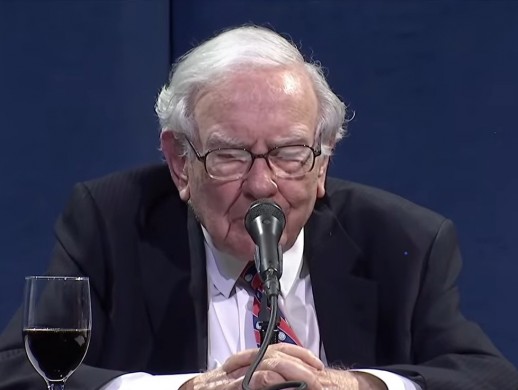I recently heard Warren Buffett and Charlie Munger talk about the logic behind share buy-backs and dividend policy (Berkshire Hathaway AGM 6th May) – it’s really not as complicated as some people make out. Warren said: “I just want to give you a feel for how the cash flows at Berkshire.” He showed this table:

Shares outstanding (Class A Equivalent)
|
Dec 2019 |
Dec 2020 | Dec 2021 | Dec 2022 | March 2023 |
| 1,624,958 | 1,543,960 | 1,477,429 | 1,459,733 |
1,450,152 |
“And you’ll notice that every year the number of our shares go down. So, if we own more businesses, and the businesses make more money, your share as shareholders at Berkshire increases every year without you laying out any money.…
“…..the alternative [is] you could receive dividends. But the reason we’ve gotten to where we are is because we kept the money.
“We did pay a dividend in 1967, $0.10 a share. It was a terrible mistake. (Laugh) And I always tell people that I’d for the men’s room and the directors voted while I was gone. But that isn’t true. I was there, I confess. (Laugh)
“But [since then] we’ve reinvested, and it’s produced the $500 billion plus of shareholders’ equity [it was around $20m in 1965] and the $30 billion plus of operating earnings [little earnings in 1965]…and we’ll continue to follow that policy because it makes a great deal of sense.”
Later on Warren, Charlie and Greg Abel were asked this question:
“Since 2019 Berkshire repurchased huge amounts of stock, reducing approximately 10% of the share count, and increasing the intrinsic value per share for the continuing shareholders. Greg [Abel] is expected to be the successor of Warren as CEO, so will he be in charge of the main capital allocation decisions, including future share buybacks?”
Warren’s response: “Well, the answer is that Greg — I’m going to turn it over to him, but the answer is Greg understands capital allocation as well as I do, and that’s lucky for us.
“And he will make those decisions, I think, very much in the same framework as I would make them. And we’ve laid out that framework now for 30 years, or something like that. People make it way more complicated than — I mean, particularly if you’re working on a doctorate or something, it’s just a great subject to have lots of footnotes in, you know, 50 pages, or 100 pages.
“But it’s no more complicated than if you and I and Charlie had a business, and you wanted to sell your interest, and we could buy it for less than we thought it was worth, and without misleading you in any way about what was going on. And we’d buy it then. But, Greg, you’re on because you’re going to be doing it in the future.” (Laugh)
Greg Abel: “Right. Yeah, well, I think, Warren, you said it really well. I mean, the framework’s been laid out, we know how you approach it, and how you and Charlie have approached it, and really don’t see that framework changing. When the opportunity present itself, we’ll want to be an active repurchaser of Berkshire shares. We think it’s a great outcome for Berkshire shareholders to own a larger piece of each of our operating businesses and the portfolio of the equity companies when the opportunity presents itself.”
Warren: “It can be the dumbest thing you can do, or it can be the smartest thing you can do…you obviously do what the business needs to do first if the opportunities are there: Grow your present business, buy additional businesses, whatever it may be.
“And then you make a decision on dividends. But that decision becomes pretty irrevocable because you don’t cut dividends without having major effects in your shareholder base and a lot of things.
“And then, if you’ve got ample capital, and you don’t see that you’re going to use it all, and your stock is attractive, and it enhances the intrinsic value for the remaining shareholders, it’s a no-brainer.
“And if it’s above the price of intrinsic value, it’s a no-brainer that you don’t even listen to anybody, no matter what investment banker comes in and tells you, “Here’s how to do a repurchase program.”
Professor Glen Arnold now offers a Managed Portfolio Service at Henry Spain Investment Services under which clients’ portfolios contain the same shares as his (write to Jackie.Tran@henryspain.co.uk)
Risk Warnings: Past performance is no guarantee of future results. Certain investments carry a higher degree of risk than others and are, therefore, unsuitable for some investors. The value of investments, and the income from them, can go down as well as up, and you may not recover the amount of your initial investment. Where an investment involves exposure to a foreign currency, changes in rates of exchange may cause the value of the investment, and the income from it, to go up or down. Opinions constitute our judgement as of this date and are subject to change without warning. Neither Henry Spain nor any connected company accepts responsibility for any direct or indirect or on sequential loss suffered by you or any other person as a result of your acting, or deciding not to act, in reliance upon any information contained in this Leaflet. Before contemplating any transaction, you should consider whether you require any advice from a financial adviser which we would be happy to provide. The Managed Portfolio Service will be a fully advised process and advise charges will apply. This is a financial promotion. Henry Spain is authorised and regulated by the Financial Conduct Authority. Registered in England and Wales No. 7118506. Registered Office: 49a High Street, Market Harborough, Leicestershire, LE16 7AF

 Hot Features
Hot Features













